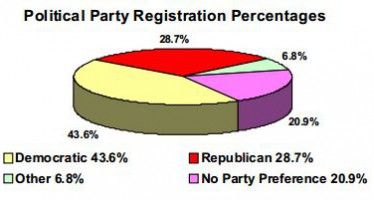Assembly Republicans: Hold steady in 2016 to build for 2017
 Facing a presidential election that’s guaranteed to overshadow them and numbering so few that passing even a simple resolution requires an act of God, Assembly Republicans are hoping to simply hold their 28 seats in 2016 while building the foundation for a resurgence beginning after the November election.
Facing a presidential election that’s guaranteed to overshadow them and numbering so few that passing even a simple resolution requires an act of God, Assembly Republicans are hoping to simply hold their 28 seats in 2016 while building the foundation for a resurgence beginning after the November election.
While critics say they lack a definitive agenda, Assembly Republican Leader Chad Mayes, who was elected in 2014 and chosen as leader just 10 months later, has been working behind the scenes to unite his caucus and build relationships on the other side of the aisle to fortify for the future.
There’s little room for error. They can only lose one seat and remain above super minority status — the difference between having the power to block tax increases on their own or not. Their troubles are compounded by the fact that voter turnout in presidential years typically leans Democrat. And presidential campaigns have a way of framing the narrative and stealing attention away from down-ticket races like state Legislature.
It’s not an easy spot for Chad Mayes, the Assembly Republican leader from Yucca Valley.
“We’re at the point now we’re thinking a lot more of that messaging is going to have to take place probably after November, to be able to tell folks what our agenda is and to begin rebuilding the brand,” Mayes told CalWatchdog on Thursday. “2016 is tough.”
It’s not that Mayes and his colleagues won’t be selling their ideas to the public — they’re going to have to if they expect to win elections. Instead, Mayes believes that most voters will chose based on the “strength of the candidates” as opposed to an automatic party preference, meaning they’ll rely on individual campaigns and not the Republican brand.
“Our work outside the building is to continue to advance our principles, to be able to tell the folks that live here in California that our ideas are the ideas that are going to move California forward,” Mayes said. Mayes is confident Republicans will hold their seats, but was iffy about picking up many seats.
Mayes often speaks of the need to address poverty. The son of a preacher, having grown up in a Yucca Valley community of modest means, he points to exorbitant housing costs, gas prices and the fact that 40 percent of Californians live near or below the poverty line as a need for a new direction.
“Obviously, we’re not doing something correctly,” Mayes said of the overall direction of state policies.
While Mayes has generally spoken in broad strokes about poverty, a few members of his caucus (including him) have introduced specific proposals. One provides additional funding for homeless youth centers, one expands the child tax credit and another funds grants to help underprivileged children do “normal” activities like buy prom dresses, attend summer camp and receive test preparation. And last year, the caucus introduced an entire education package.
But is it enough?
The bunkered approach to 2016 and the behind-the-scenes maneuvering for 2017 leaves the strategy open to criticism.
“If the Assembly Republicans have a distinct agenda, they have been quiet about it,” said John J. Pitney, Jr., a professor of American politics at Claremont McKenna College.
Pitney noted the difficulties Republicans face in the Legislature dominated by Democrats, being handicapped by less resources than the majority party. Even if they labored over an exhaustive agenda, it’s possible no one would notice, said Pitney — a reflection of his own struggles in the mid 1980s as a House Republican staffer.
Pitney likened Mayes to Jack Kemp, the former New York Republican congressman and vice presidential candidate, known for inclusivity and “bleeding-heart conservatism.”
“But as Kemp learned, it is very hard to make political headway with a conservative war on poverty,” Pitney added. “Many rank-and-file Republicans just are not interested.”
On the other side of the rotunda
Life is no less difficult for Republicans in the Senate, who have even less of a margin of error in 2016, with no room to lose any seats. The Senate unveiled a package of bills earlier this week aimed at making life in California more affordable, with Leader Jean Fuller of Bakersfield making a similar pitch to Mayes.
On Tuesday, Fuller cited damning stats: CNBC ranked California the 5th most expensive state to live in the country in 2015, average monthly rent is 50 percent higher here than in the rest of the country, 40 percent of Californians are living at or near the poverty line and Californians have one of the highest tax burdens in the country.
Legislating
According to Bill Whalen, a research fellow at the Hoover Institution at Stanford University, Republicans in the Legislature face three legislative options. The first is to have an idea embraced by Democrats, which carries the bill to the governor’s desk. The other two are that the bill is dead on arrival or gets a hearing and then fizzles out.
“There’s three outcomes, two of which are negative,” said Whalen, who served as chief speechwriter and director of public affairs for former Republican Gov. Pete Wilson.
Whalen pointed to a constitutional amendment in 2010 that reduced the two-thirds majority approval of a budget to just simple majority, stripping Republicans of an annual leverage point.
“For a few weeks anyway, Republicans had a lot of relevance in the process,” Whalen said.
Whalen suggested Republicans focus on greater ethics rules as a way to engage in a value debate with Democrats, adding that Republicans should be holding press conferences pressuring Roger Hernández to take a leave of absence at least while under a court order to stay away from the West Covina Democrat’s wife amid domestic violence allegations, similar to the approach used by former Republican Congressman Newt Gingrich in the early 1090s.
Gingrich used both the policy-driven Contract with America and a focus on ethics issues — like Jim Wright’s book deal, the House banking scandal and the Barney Frank/male prostitute scandal — to make the argument that Democrats had become corrupted during decades of power and engineered the first Republican majority in 40 years. However, Whalen added, the numbers for Republicans in the Legislature are much further from a majority than what Gingrich had.
“They made it a value debate against Republicans and Democrats,” Whalen said. “And I think Republicans need to introduce that conversation into Sacramento.”
Whalen also suggested luring undecided voters with a greater focus on the University of California system — where one chancellor is mired in salary and spending troubles while a recent audit showed preferential treatment to out-of state admissions in an effort to bring in higher tuitions — including audits, hearings where chancellors explain their budgets and “completely turn the UC upside down.”
Mayes told CalWatchdog that individual Assembly Republicans had already adopted the UC issue, and added that it was Democrats’ responsibility to hold their members, like Hernández accountable.
Politics
In general, the governor and the legislative caucuses are the main messaging arm of the state parties, making the Legislature that much more important when not occupying the Governor’s Mansion. But California Republican Party and legislative leaders shy away from a top down approach.
“Messaging in campaigns is important, but that messaging has to be delivered by the candidate or the elected officials of that party,” said Jim Brulte, chairman of the California Republican Party. “And that’s because voters vote for candidates not political parties. Political parties can be helpful with technical and financial support.”
Modern campaigns, particularly in a large, diverse state like California, need to be tailored to the district — voters in Torrance have different needs from voters in south Orange County.
“One-size-fits-all messaging may have worked 30 or 40 years ago, but with the technology advances in the ability to micro target, this approach is stale and outdated,” Brulte said.
Brulte added that the Contract with America was pushed from members of Congress and not the Republican National Committee. Brulte said timing was crucial, noting it was unveiled merely six weeks before the midterm elections, when voters were paying the most attention to Congress.
“Other than specific messaging by individuals in the district they represent, a global messaging strategy during a hotly contested presidential election between the five remaining candidates is bound to get lost,” Brulte said.
Related Articles
California's business exodus
Feb. 25, 2010 By KATY GRIMES According to Joe Vranich, a business relocation specialist located in Southern California, his business
‘You don’t get free things’ Filner unlikely to quit
A source close to Filner tells me rumors that he will resign today are untrue. — Craig Gustafson (@gustafsoncraig) August
‘No Party Preference’ gains in CA voter registrations
“No Party Preference” continues its gradual rise in voter registrations according to new data released today by California Secretary of




